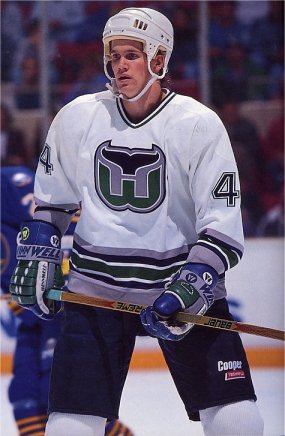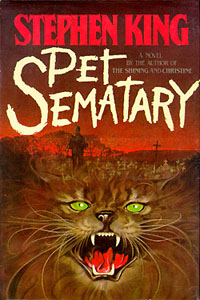

When Chris Pronger first entered the NHL he was considered to be the next generation in a long line of big, strong defenders who specialized in taking up space and preventing goals, yet who still had the scatting speed to join the odd rush and create scoring opportunities. After a few years of growing pains, laboring under those high expectations, Pronger matured into a leader both on his team in the league. Pronger grew up in Dryden, Ontario, and began playing hockey in his parent's basement with his older brother Sean. He made the move to junior hockey at 17 with the Peterborough Petes of the OHL. He quickly established himself as an impact player, especially to the unfortunate players who ran into him but also on the score sheet. He was the top scoring defenceman in the OHL that first season. The following year, 1992-93, he was even better, picking up honors across the country as he learned to dominate with his size in the defensive zone. He led the Petes to the Memorial Cup finals and was a stalwart defender on the Canadian team that won the gold medal at the World Junior Championships. He was selected as the best defenceman in Canadian major junior hockey, pretty good for an 18-year-old kid who was still growing. At the 1993 NHL Entry Draft, the Hartford Whalers chose him second overall behind Alexandre Daigle. Pronger began his career with the Whalers as a young player with plenty of hype riding on his wide shoulders. Whaler general manager Brian Burke had made two trades on the draft floor to secure his rights, and the team was relying on Pronger not just to have a good first season but also potentially to save the team, which was struggling and losing money. Pronger steadily improved over the year and was named the Whaler's best defender. He also earned a place on the NHL's All-Rookie Team. The Whalers missed the playoffs for the second consecutive year however, and the patience needed for a young player to develop into a star, let alone a franchise player, began to dissipate in Hartford.


After Hartford missed the playoffs again in 1994-95, the team decided to trade Pronger to St. Louis for Brendan Shanahan. The Blues showed a great deal of confidence in the young defender. He was given a contract extension soon after his arrival, but the fans were slow to come around to his side. Still only 22-years-old, Pronger entered his fourth pro season and began to play like a veteran. He showed remarkable improvement and had 35 points as well as a plus-15 rating to lead the team. In 1997 he was named Blues' captain and with the added confidence became a dominating presence for the team. When the Team Canada roster was announced for the 1998 Nagano Olympics, Pronger's name was on it. He was the team's youngest member. Pronger had his best offensive season in 1998-99, finishing with 46 points and playing in the All-Star Game for the North American Team. His defensive play placed him near the top in voting for the Norris Trophy again, a good position for a young player who honed his skills guarding a cushion in the basement. Pronger's 1999-00 season was the most dominating in years. He had a career high 62 points and was a plus-52 and led the Blues to their best season ever. Although the team was upset in the first round of the playoffs, Pronger won both the Norris Trophy and Hart Trophy at the NHL Awards ceremony, the first defenceman to accomplish this since Bobby Orr. After an injury plagued 2000-01 season, Pronger returned in 2001-02 and was instrumental in helping Canada capture it's first Olympic gold medal in 52 years at the 2002 Olympic Games in Salt Lake City. A nagging wrist injury limited Pronger to a mere five regular season games in 2002-03, before he rebounded the following year with 54 points (14-40-54), including his 400th career point. After washed out 2004-05 NHL season, Pronger was acquired by the Edmonton Oilers in the summer of 2005 in a multiple player deal that saw the Blues acquire young defenseman Eric Brewer.






































































































































































